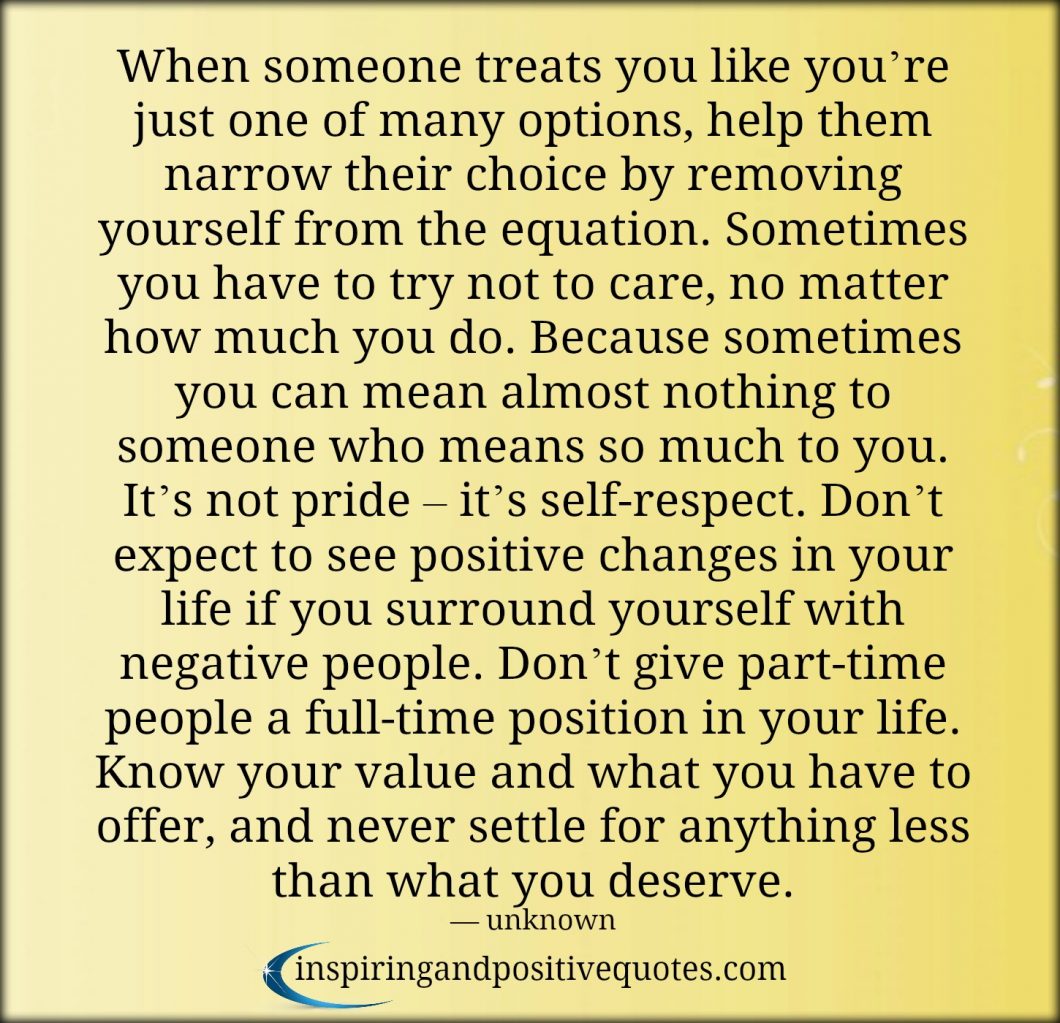When someone treats you like you’re just one of many options, help them narrow their choice by removing yourself from the equation. Sometimes you have to try not to care, no matter how much you do. Because sometimes you can mean almost nothing to someone who means so much to you. It’s not pride – it’s self-respect. Don’t expect to see positive changes in your life if you surround yourself with negative people. Don’t give part-time people a full-time position in your life. Know your value and what you have to offer, and never settle for anything less than what you deserve. — unknown
Introduction
In a world full of many choices, it’s not unusual to feel like you’re just one of many options in someone’s life. This can be sad, especially when you really care about someone who doesn’t seem to treat you with the same care and respect. However, it’s important to remember that you should be important to others, not just a backup plan.
As you deal with relationships, whether they’re personal or at work, it’s vital to know your own value and set good boundaries. In this article, we will talk about why it’s important to respect yourself, understand how valuable you are, and the benefits of taking care of yourself when you’re in situations where you feel like you’re not a top choice. By the end, you’ll have some good ideas on how to handle these situations with confidence and self-assurance.
Recognizing Your Worth
Understanding your own value
It all begins with understanding your self-worth. You are unique, with your own set of qualities, talents, and experiences that make you special. Don’t let anyone make you feel otherwise. When you recognize your worth, you naturally become less tolerant of situations where you’re treated as an afterthought.

Avoiding negative people
Positive changes in your life can only occur when you surround yourself with positivity. Negative people can drain your energy and make you question your value. It’s essential to distance yourself from those who don’t appreciate your presence or respect your feelings.

Setting Boundaries
Not giving part-time people a full-time position in your life
Sometimes, we invest too much time and effort in individuals who only see us as an option when it’s convenient for them. It’s vital to set boundaries and reserve a special place in your life for those who genuinely appreciate and reciprocate your efforts.
Knowing when to walk away
Walking away from a situation where you’re not valued may be challenging, but it’s an act of self-respect. Remember, it’s not about pride; it’s about maintaining your self-worth and emotional well-being.

The Power of Self-Care
Prioritizing self-care is a fundamental aspect of maintaining your self-respect. When you focus on your well-being and happiness, you become less dependent on external validation. Take time to do things that bring you joy, pursue your passions, and nurture your mental and emotional health.

1. How do I recognize my self-worth in a relationship?
Recognizing your self-worth in a relationship is essential for your overall well-being. Here are some steps to help you recognize your self-worth:
- Self-Reflection: Take time to reflect on your qualities, strengths, and what makes you unique. Understand that you bring value to any relationship through your kindness, love, and support.
- Healthy Boundaries: Set clear boundaries in your relationship. Boundaries help you define what you’re comfortable with and what crosses the line. Recognize that it’s okay to say “no” when something doesn’t align with your values or makes you uncomfortable.
- Communication: Open and honest communication is key. Express your thoughts, feelings, and needs to your partner. A healthy relationship involves both parties understanding and respecting each other’s emotions and desires.
- Self-Care: Prioritize self-care and self-love. Engage in activities that make you feel happy and fulfilled, both inside and outside the relationship. Your well-being is vital, and taking care of yourself contributes to a healthier partnership.
- Red Flags: Pay attention to any red flags in the relationship. If your partner consistently disrespects you, ignores your needs, or belittles you, it’s essential to recognize these signs and take them seriously.
- Seek Support: Talk to friends, family, or a therapist if you’re struggling to recognize your self-worth. They can provide valuable insights and support to help you navigate your feelings and emotions.
2. What should I do if someone treats me like an option?
If someone consistently treats you like an option in a relationship, it’s essential to take steps to address the situation and prioritize your well-being. Here’s what you can do:
- Self-Reflection: Start by reflecting on your feelings and the dynamics of the relationship. Assess how this treatment is affecting your emotional well-being and self-esteem.
- Communication: Have an open and honest conversation with the person who is treating you as an option. Express your feelings and concerns calmly and assertively. Use “I” statements to avoid sounding accusatory. For example, say, “I feel hurt when I’m not a priority in your life.”
- Set Boundaries: Clearly define your boundaries and what you expect from the relationship. Let the person know what treatment is unacceptable and what changes you need to see for the relationship to be healthy and fulfilling for both parties.
- Evaluate Their Response: Pay attention to how the person responds to your concerns. Are they willing to acknowledge your feelings and make an effort to change their behavior? Or do they dismiss your concerns and continue treating you as an option?
- Consider Your Options: Assess whether the relationship is worth continuing. Sometimes, despite your efforts, the other person may not be willing to change their behavior. In such cases, you may need to make a difficult decision about whether to continue the relationship or move on.
- Prioritize Self-Care: Regardless of the outcome, prioritize self-care. Focus on activities and practices that boost your self-esteem and well-being. Surround yourself with supportive friends and engage in hobbies and interests that bring you joy.
- Seek Support: If the situation becomes emotionally overwhelming or difficult to navigate, consider seeking support from friends, family, or a therapist. They can offer guidance and a listening ear during challenging times.
Remember that you deserve to be in a relationship where you are valued, respected, and treated as a priority. Don’t settle for being an option when you deserve to be someone’s top choice. Your well-being should always be a priority in any relationship.
Remember that your self-worth is not dependent on the approval or actions of others. You are valuable and deserving of love and respect in any relationship.
3. Is it selfish to prioritize self-care?
Prioritizing self-care is not selfish; it’s essential for your overall well-being. Self-care is a practice of taking deliberate actions to maintain and improve your physical, mental, and emotional health. Here’s why prioritizing self-care is not selfish:
- Improved Mental Health: Self-care activities, such as meditation, mindfulness, or engaging in hobbies you enjoy, can reduce stress and anxiety, improving your mental health. When you prioritize your mental well-being, you are better equipped to handle life’s challenges and support those around you.
- Emotional Well-Being: Self-care helps you connect with your emotions and understand your feelings better. It allows you to process and express your emotions in a healthy way, leading to better emotional well-being. This, in turn, positively impacts your relationships with others.
- Physical Health: Engaging in physical self-care, like exercise and a balanced diet, contributes to your physical health. When you take care of your body, you have more energy and vitality to engage with life and those you care about.
- Prevent Burnout: Prioritizing self-care prevents burnout. When you constantly give to others without taking time for yourself, you may become emotionally and physically depleted. Self-care ensures you have the resilience to continue supporting others without sacrificing your well-being.
- Setting Boundaries: Self-care involves setting healthy boundaries. It helps you determine what you can and cannot do, ensuring that you don’t overextend yourself and become overwhelmed by the demands of others.
- Enhanced Relationships: When you practice self-care, you’re in a better position to be present and engaged in your relationships. You can offer genuine support and love to others because you’ve first taken care of yourself.
- Personal Growth: Self-care fosters personal growth and self-awareness. It allows you to explore your passions, interests, and aspirations, leading to a more fulfilling life.
- Role Modeling: By prioritizing self-care, you set a positive example for those around you, demonstrating the importance of self-love and well-being. This can inspire others to do the same.
4. How can I avoid negative people in my life?
Avoiding negative people in your life is essential for your overall well-being and mental health. Here are some steps you can take to minimize the presence of negative individuals:
- Identify Negative Patterns: Recognize the signs of negative people. They often complain excessively, focus on the negative aspects of situations, and drain your energy with their constant pessimism.
- Set Boundaries: Establish clear boundaries in your relationships. Be assertive about what behavior you find unacceptable, and communicate your boundaries respectfully. Let negative individuals know that you won’t tolerate toxic behavior.
- Limit Contact: If possible, reduce or limit your contact with negative individuals. You don’t have to completely cut them out of your life, but minimizing exposure can help protect your mental and emotional well-being.
- Surround Yourself with Positivity: Cultivate a circle of friends and acquaintances who are positive, supportive, and uplifting. Spend more time with people who inspire and encourage you.
- Practice Self-Care: Engage in self-care activities that boost your resilience to negativity. This includes mindfulness, meditation, exercise, and pursuing your passions. When you prioritize self-care, you become better equipped to deal with negativity when it arises.
- Avoid Gossip and Drama: Refrain from participating in gossip or drama that can attract negative people. Instead, steer conversations toward positive and constructive topics.
- Learn to Say No: Don’t feel obligated to say “yes” to every request or invitation, especially if it involves spending time with negative individuals. It’s okay to decline politely when you feel it’s in your best interest.
- Seek Support: Share your experiences with trusted friends or a therapist. They can provide guidance and a listening ear when you’re dealing with negative individuals.
- Focus on Solutions: When negative people bring up problems, try to shift the conversation toward solutions and positive actions. This can help redirect their mindset and yours.
- Empathize but Don’t Enable: While it’s important to be understanding, be cautious not to enable negative behavior. Offer support when appropriate, but avoid being drawn into their negativity.
- Evaluate Relationships: Periodically assess your relationships and their impact on your life. If a relationship consistently brings negativity without positive aspects, consider whether it’s worth maintaining.
- Practice Gratitude: Cultivate a mindset of gratitude. Focusing on the positive aspects of your life can help counterbalance the influence of negative individuals.
Remember that avoiding negative people is not about being judgmental or dismissive. It’s about prioritizing your mental and emotional well-being. Surrounding yourself with positivity and setting healthy boundaries are crucial steps in creating a more fulfilling and uplifting social environment.
Remember that self-care is not about neglecting your responsibilities or being self-centered. It’s about maintaining a healthy balance between caring for yourself and caring for others. When you prioritize self-care, you become better equipped to contribute positively to your relationships, work, and community. In essence, it’s an act of self-compassion and a necessary aspect of leading a fulfilling life.

5. What is the difference between self-respect and pride?
Self-respect and pride are related concepts, but they have distinct differences:
Self-Respect:
- Self-Worth: Self-respect is about recognizing your inherent worth as a human being. It involves understanding that you have value, irrespective of external factors such as achievements, status, or the opinions of others.
- Healthy Esteem: Self-respect is a healthy form of self-esteem. It’s based on a positive and realistic self-perception. You acknowledge your strengths and weaknesses without excessive self-criticism or arrogance.
- Respect for Others: Self-respect often goes hand-in-hand with respecting others. When you have a healthy sense of self-respect, you’re more likely to treat others with dignity and respect as well.
- Boundaries: Self-respect involves setting and maintaining boundaries. You know what treatment is acceptable to you, and you assertively communicate your limits to others.
- Empathy: Self-respect doesn’t preclude empathy. You can empathize with others’ experiences and feelings without compromising your own self-worth.

Pride:
- Excessive Self-Regard: Pride can sometimes be associated with an excessive or inflated sense of self. It may involve an overestimation of one’s abilities or accomplishments.
- Comparative: Pride often involves comparing oneself to others. It can lead to a competitive mindset where one seeks to be superior or more accomplished than others.
- Ego-Driven: Pride can be ego-driven and may result in a reluctance to admit mistakes or weaknesses. It can hinder personal growth and learning.
- Negative Connotations: While pride can have positive aspects, it also carries negative connotations when it becomes excessive or leads to arrogance, prejudice, or a lack of humility.

In summary, self-respect is about recognizing your intrinsic worth, maintaining healthy self-esteem, and respecting both yourself and others. It involves setting boundaries and practicing empathy. Pride, on the other hand, can sometimes be excessive, ego-driven, and comparative, leading to a different set of behaviors and attitudes. Balancing self-respect and pride involves cultivating a positive self-image while avoiding arrogance and excessive self-importance.
Final Thoughts
In conclusion, your self-respect is paramount in all your relationships. You deserve to be a priority, not an afterthought. By recognizing your worth, setting boundaries, and practicing self-care, you can ensure that you are treated with the respect and love you deserve.

Remember the wisdom encapsulated in the words:
“When someone treats you like you’re just one of many options, help them narrow their choice by removing yourself from the equation. Sometimes you have to try not to care, no matter how much you do. Because sometimes you can mean almost nothing to someone who means so much to you. It’s not pride – it’s self-respect. Don’t expect to see positive changes in your life if you surround yourself with negative people. Don’t give part-time people a full-time position in your life. Know your value and what you have to offer, and never settle for anything less than what you deserve.” — Unknown
As you embark on your journey to prioritize self-respect and maintain healthy boundaries, remember that your happiness and well-being are non-negotiable. You are the author of your own story, and you have the power to shape it with dignity, self-assurance, and the knowledge that you are worth every bit of love and respect you seek in your life.


